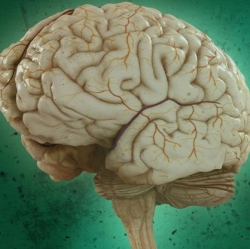
Sleep deprivation is a quick and efficient way to treat depression. It works 60 to 70 percent of the time—far better than existing drugs—but the mood boost usually lasts only until the patient falls asleep.
As an ongoing treatment, sleep deprivation is impractical, but researchers have been studying the phenomenon in an effort to uncover the cellular mechanisms behind depression and remission. Now a team at Tufts University has pinpointed glia as the key players.
The researchers previously found that astrocytes, a star-shaped type of glial cell, regulate the brain chemicals involved in sleepiness. During our waking hours, astrocytes continuously release the neurotransmitter adenosine, which builds up in the brain and causes “sleep pressure,” the feeling of sleepiness and its related memory and attention impairments. The neurotransmitter causes this pressure by binding to adenosine receptors on the outside of neurons like a key fitting into a lock. As more adenosine builds up, more receptors are triggered, and the urge to sleep gets stronger.
In the new study, published online January 15 in the journal Translational Psychiatry, the scientists investigated whether this process is responsible for the antidepressant effects of sleep deprivation. Mice with depressivelike symptoms were administered three doses of a compound that triggers adenosine receptors, thus mimicking sleep deprivation. Although the mice continued to sleep normally, after 12 hours they showed a rapid improvement in mood and behavior, which lasted for 48
